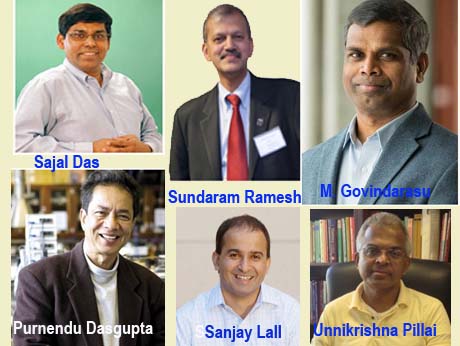
December 31 2015: The Institute of Electrical and Electronics Engineers board of directors last month approved nearly 25 Indian Americans, four Indians in India, and five Indians in other countries among the 300 researchers worldwide who qualified for Fellow status, effective Jan. 1, 2015, reports.
We reproduce the list and the pictures courtesy IndiaWest who carried the orignal report.
Following a rigorous, annual evaluation procedure, the IEEE Fellow Committee recommends a select group of recipients for elevation to IEEE Fellow. Less than one-tenth of one percent of voting members are selected annually for elevation to the highest member grade.
The Indian American researchers, and their projects, include:
Sajal Das, of the Missouri University of Science and Technology, for contributions to parallel and distributed computing; and Dipankar Dasgupta, of the University of Memphis, for contributions to immunological computation and bio-inspired cyber security.
Purnendu Dasgupta, of the University of Texas at Arlington, for contributions to ion chromatography and analytical instrumentation for environmental studies; and Murthy Devarakonda, of IBM Watson Research Center, for contributions to measurement-based analytics of distributed systems for data center optimization.
Amitava Ghosh, of Nokia Solutions and Networks, for leadership in cellular communication system standardization; and Monisha Ghosh, of Interdigital Communications, Inc., for contributions to cognitive radio and signal processing for communication systems.
Nachappa Gopalsami, of Argonne National Laboratory, for contributions to millimeter-wave spectroscopy, imaging, and reflectometry; and Manimaran Govindarasu, of Iowa State University, for contributions to the security of power grids.
S. Gunasekaran, of AFRL-Information Directorate, for contributions to high-performance computer vision algorithms for airborne applications; and Deepnarayan Gupta, of HYPRES Inc., for contributions to superconductor digital radio-frequency receivers.
Ravishankar Iyer, of Intel Corporation, for contributions to computer architecture and cache/memory systems; Nihar Jindal, of Broadcom Corporation, for contributions to multiuser multi-antenna communications; and Anupam Joshi, of the University of Maryland, for contributions to security, privacy and data management in mobile and pervasive systems.
Mohan Kalkunte, of Broadcom Corporation, for contributions to ethernet switching architectures and merchant-switching silicon; Sanjay Lall, of Stanford University, for contributions to control of networked systems; and Abhijit Mahalanobis, of Lockheed Martin Missiles and Fire Control, for contributions to the development of correlation filters for automatic target recognition.
Debendra Mallik, of Intel Corporation, for contributions to microprocessor packaging; Krishna Narayanan, of Texas A&M University, for contributions to coding for wireless communications and data storage; and Unnikrishna Pillai, of NYU Polytechnic School of Eng., for contributions to adaptive signal processing and radar systems.
Radha Poovendran, of the University of Washington, for contributions to security in cyber-physical systems; Sundaram Ramesh, of California State University, Northridge, for contributions to entrepreneurship in engineering education; and Ponnuswamy Sadayappan, of Ohio State University, for contributions to parallel programming tools for high-performance computing.
Suresh Subramaniam, of George Washington University, for contributions to optical network architectures, algorithms, and performance modeling; Vaithianathan Venkatasubramanian, of Washington State University, for contributions to on-line detection of oscillatory behavior of electric power systems; and Mahesh Viswanathan, of IBM Corporation, for contributions to ubiquitous access to cloud computing and to vehicular speech communications.
The Indian researchers in India, and their projects, include:
Vivek Agarwal, of the Indian Institute of Technology-Bombay, for contributions to topologies and control schemes; Chandan Chakraborty, of the Indian Institute of Technology Kharagpur, for contributions to estimation techniques and control of induction machine and drive systems.
K.V.S. Hari, of the Indian Institute of Science Bangalore, for contributions to high-resolution signal parameter estimation; and Bhaskar Ramamurthi, of the Indian Institute of Technology Madras, for development of wireless technology in India.
Researchers of Indian origin, and their projects, working in other countries include:
Charanjit Bhatia, of the National University of Singapore, for contributions to magnetic head-media interfaces and tribology; Rajkumar Buyya, of University of Melbourne, for contributions to cloud computing; and Deepa Kundur, of the University of Toronto, for contributions to signal processing techniques for multimedia and cyber security.
Ponnuthurai Suganthan, of Nanyang Technological University, Singapore, for contributions to optimization using evolutionary and swarm algorithms; and Rajeev Thottappillil, of the KTH Royal Institute of Technology in Stockholm, Sweden, for contributions to the understanding of lightning and electromagnetic interference.